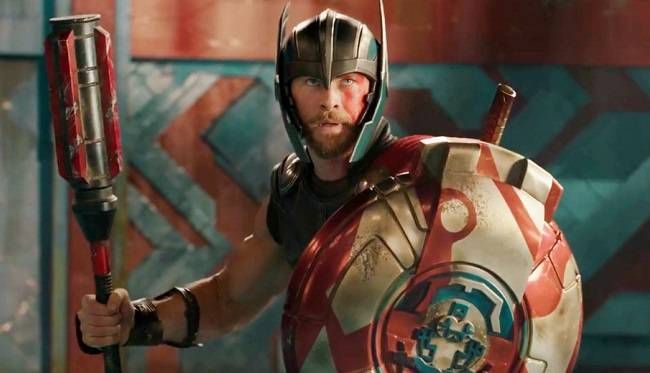
Books and Comics to Prepare for ‘Thor: Ragnarok’
Ragnarok is nigh!
Damn. That was funnier a year ago.
I mean Thor: Ragnarok of course. Though honestly, our chances of making it to November are…well, in the words of the sage, “Never tell me the odds.” Whether you’re prepping for the end of our world or the next installment of Marvel’s Phase Three, forewarned is forearmed. Here are some reads to get you started:
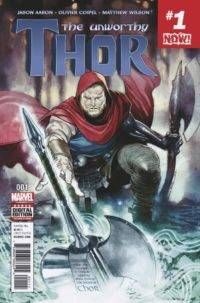
Who, and what, is Thor without Mjolnir? What did he do to become unworthy of her? What in the (literal) Hel is he going to do now? I don’t know if the movie is going to take the same plot path as the comic (I suspect not) but the sense of loss and the absence of purpose which accompany Mjolnir’s defection in the comic seem to have made their way into Waititi’s film interpretation of the end of the Norse cosmos. Unworthy is a beautiful and heartbreaking read even if Odinson has never been one of your go-to characters; even the Thunderer isn’t immune to the fragility of life’s delicate balance and if his can be shattered by a few whispered words, then perhaps he is more human, and more like us, than we realized. On a lighter note, Ragnarok has clearly borrowed Thor’s new do from Copiel, Jacinto, and Alixe’s art, and I, for one, am a huge fan.
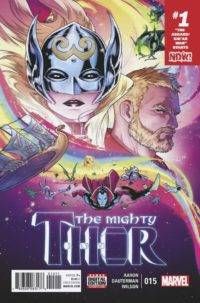
This book…something in every issues grabs me and shakes me and makes me cry. Part of it is having a friend who has been battling stage IV breast cancer for going on four years. Part of it is Jane’s willingness to take the burden of suffering from others and into herself, not only as Doctor Jane Foster but also as Thor, Goddess of Thunder, who will do anything to protect all innocents no matter who, or what, they are. Our world needs more true heroism, be it manifested in the person of the mayor of San Juan or in the Mighty Thor.
On an artistic level, this run of Mighty Thor has explored color and kinetics in a way rarely seen in comics and Waititi has been paying close attention. I expect the most gorgeous of Marvel movies to date in Ragnarok and I’m not (only) talking about the objective aesthetics of the cast.
Thor: Ages of Thunder: Matt Fraction, Patrick Zircher, Clay Mann (2009)
Wherein we get another view of Thor, one we glimpsed at the start of the first Thor film but which was quickly erased by his daring heroics on Midgard. In the classic versions of Norse myths, Thor isn’t all shine and self-sacrifice: he is brave and loyal, yes, but he is also arrogant, petulant, selfish, and even, on occasion, cruel. In short, Thor can be a total douchebag when the mood strikes and possibly not always as worthy of Mjolnir as he likes to thinks. It’s a shift in mindset to see any hero in a less than flattering light and it’s been a long time since comic Thor, or we, explored that bit of the Thunderer in any depth; ease yourself in with this collection. Fair warning: the art is more on the old school side in terms of the way the characters, especially the women, are drawn. Like, the Enchantress seriously needs some pants.
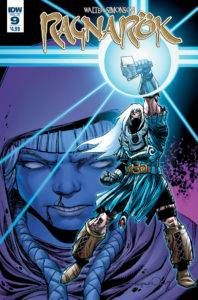
Simonson, a many-times over legend in the world of comics rightfully lauded for his work in the Thor-verse (including the creation of Beta Ray Bill), gifts us with his own interpretation (words and art) of the Norse universe after Ragnarok. We see what happens when the gods lose. It’s a grim tale, apropos for the season, sad and fascinating and oddly hopeful all at once. It’s a reminder that even after the worst occurs, if we look hard enough, we can find a reason to go on and something of life to salvage. I don’t know about you, but at the moment, I can use every reminder, every tiny hope, I can get.
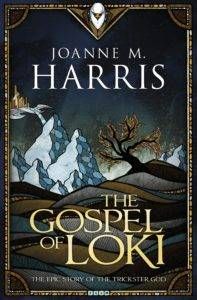
The Gospel of Loki slid in under a lot of radars a few years back; I had a hard time getting my hands on it and ultimately had to go through Amazon Marketplace and procure a copy from the UK. It’s a phenomenal novel, the stories of Norse mythology told from Loki’s perspective, incontrovertible truths from the lips of an entirely unreliable narrator. There are hints of this opposing voice in the Poetic Edda and the Prose Edda, times when the gods wanted something done, asked Loki to do it for them knowing who he was and how he operated, and then blamed him when things went awry; but Harris’s Gospel is a long-awaited, in-depth examination of the dissonance. It is also a truth universally known Thor would have had way less fun, and would never have experienced the joy of being a “bride” without Loki’s scheming. An excellent, entertaining, engaging reminder that every story has two, or more, sides and maybe, just maybe, some villains aren’t quite as bad as they seem. Though at times, it’s also possible they’re far, far more dangerous.
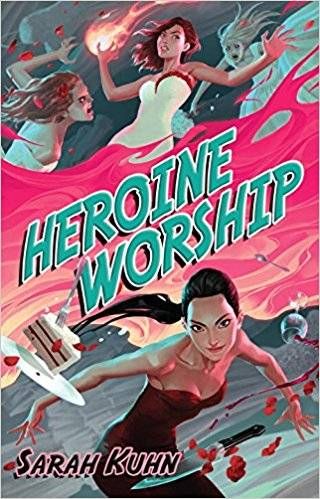
Sometimes, it’s fun to be a hero. Pure, simple, unadulterated fun. Kuhn’s Aveda Jupiter, despite pitfalls, confusion, and upset, never forgets this and approaches every mission with such gusto and abandon (despite concerns re: her wardrobe and social media presence) one can’t help but be swept along for the ride. Watch the Ragnarok trailer again: watch Loki flip his knives, Thor ready his helmet (those wings, though), the Hulk throw himself into battle against all comers and you’ll remember why books and comics and movies about superheroes are such a glorious escape. Imperfect, reckless, fabulous Aveda is an ideal reminder going into the fantastic madness of Ragnarok.
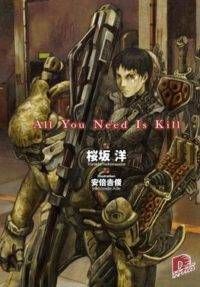
You can choose which form of this story you’d prefer: illustrated novel or manga, but if you’re looking for balls to the wall, gladiatorial action, this is the place to find it. Adapted into the adequate Edge of Tomorrow, the film does fall short on the sheer bloody-mindedness and desperation of various bids for freedom so integral to the emotional roller coaster that is All You Need is Kill. I’m quite sure my heart rate elevated several times in the course of my reading, which is good because I don’t get much cardio these days. If the arena fight between Thor and Hulk gets your blood pumping and you need something to tide you over until November 3rd, I highly recommend All You Need is Kill. Believe it or not, amid and between fight scenes, the book also finds opportunities to explore some pretty huge existential questions: what is free will? What are we without it? What does life mean if you’re forced to live it over and over again? If you have a chance to free yourself, do you take it before you go mad or do you suffer in the hopes of saving others? Does the approach of the end of all things change your obligations? Certainly issues we’ll see Thor wrestling with a month from now.
There you have it. Go forth and prepare yourselves for glory, mortals.
Verily.











